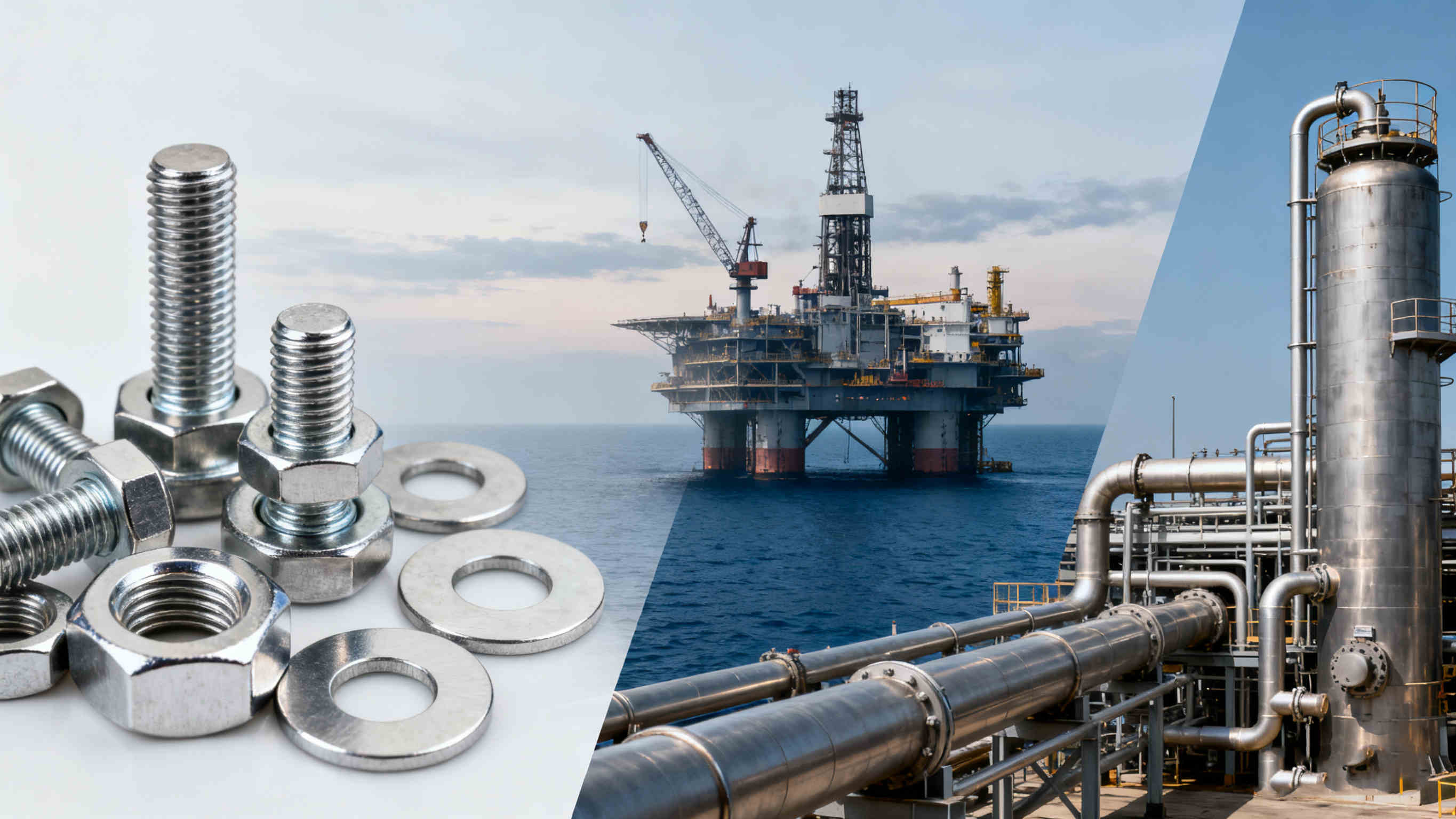The oil and gas industrial sector demands materials that can withstand harsh environments, extreme temperatures, and constant exposure to corrosive substances. In these challenging conditions, choosing the right fastening solutions becomes essential. This is where stainless steel fasteners play a critical role. With their exceptional corrosion resistance, durability, and high performance, they ensure safety and reliability across a wide range of applications in oil and gas operations.
From pipelines to offshore rigs, the industry relies on stainless steel fasteners to meet its toughest requirements. This article explores their importance, key benefits, and specific applications that demonstrate why stainless steel is the preferred material for these demanding environments.

Why Stainless Steel Fasteners Are Essential in the Oil and Gas Industrial Sector
The oil and gas industry operates in environments where exposure to saltwater, chemicals, hydrogen sulfide, and extreme pressures is common. In such conditions, stainless steel fasteners offer superior performance due to several reasons:
1. Exceptional Corrosion Resistance
Corrosion is one of the biggest challenges in oil and gas facilities. Whether onshore or offshore, systems often operate in environments with high salinity, moisture, and chemicals.
Different grades of stainless steel such as 304, 316, 317, or duplex steel deliver outstanding corrosion resistance, extending the service life of equipment.
2. High Strength and Durability
Oil and gas operations involve heavy mechanical loads, vibration, and continuous pressure changes. Stainless steel fasteners provide high strength and maintain structural integrity over long periods, even under extreme stress conditions.
3. High Performance in Extreme Environments
Stainless steel maintains exceptional stability in both high and low temperatures. Its high performance in cryogenic conditions and high-heat zones makes it the ideal choice for the energy sector.
4. Compatibility with Critical Components
Fasteners such as bolts, nuts, and washers must integrate perfectly with different equipment types in oil and gas systems. Stainless steel provides reliability and ensures secure, leak-free connections.
Specific Applications of Stainless Steel Fasteners in Oil and Gas Projects
Stainless steel fasteners are used across a wide range of specific applications in upstream, midstream, and downstream operations. Key areas include:
1. Offshore Platforms and Rigs
Offshore environments expose components to saltwater and constant humidity. Stainless steel’s unmatched corrosion resistance makes it ideal for structural connections, safety equipment, and high-load applications.
2. Pipelines and Flowlines
Pipeline systems require strong, leak-proof fastening solutions that can tolerate vibration and chemical exposure. Stainless steel bolts and nuts washers ensure long-term stability in transporting crude oil, natural gas, and refined products.
3. Refinery Equipment
High temperatures and chemical processing demand highly resistant materials. Stainless steel fasteners maintain high strength even in reactors, heat exchangers, boilers, and combustion systems.
4. Storage Tanks and Pressure Vessels
Stainless steel fasteners support flange connections, manways, ladders, and structural elements where safety and reliability are essential.
5. Subsea Installations
Deep-sea environments are highly corrosive and require materials that can endure extreme pressures and continuous water exposure. Advanced grades of stainless steel such as duplex, super duplex, and Inconel-based fasteners are often used.
Benefits of Using Stainless Steel Fasteners in Oil and Gas Projects
Choosing stainless steel fasteners provides multiple advantages:
- Long-term corrosion resistance in the toughest environments
- Reliable high strength for heavy-duty operations
- Compatibility across a wide range of equipment
- Improved safety and operational efficiency
- Reduced maintenance and minimized downtime
- Resistance to chemicals, sulfides, and chlorides
- Availability in multiple sizes, types, and grades of stainless steel
These benefits make stainless steel the preferred fastening solution for critical oil and gas applications.
Frequently Asked Questions (FAQ)
1. Why are stainless steel fasteners preferred in oil and gas industrial applications?
Because they provide excellent corrosion resistance, high performance, and long-term durability under extreme environmental conditions.
2. Which grades of stainless steel are best for oil and gas projects?
Common grades of stainless steel include 304, 316, 317L, duplex, and super duplex. The choice depends on corrosion levels, temperature, and chemical exposure.
3. Do stainless steel fasteners offer better strength than carbon steel?
Yes. In harsh oil and gas environments, stainless steel fasteners offer superior high strength, especially when exposed to saltwater, high temperatures, or chemicals.
4. Where are stainless steel nuts and washers used in oil and gas systems?
They are widely used in pipelines, pumps, pressure vessels, offshore platforms, and refinery equipment to create secure and leak-resistant connections.
5. Are stainless steel fasteners suitable for high-temperature applications?
Yes. Many stainless steel grades are designed for high performance in high-temperature or cryogenic conditions.
Conclusion
Stainless steel fasteners play an indispensable role in oil and gas industrial projects. Their mix of corrosion resistance, high strength, and adaptability across a wide range of specific applications makes them essential for safe and reliable operations. From pipelines to refineries and offshore rigs, stainless steel ensures long-term performance under the harshest conditions.
